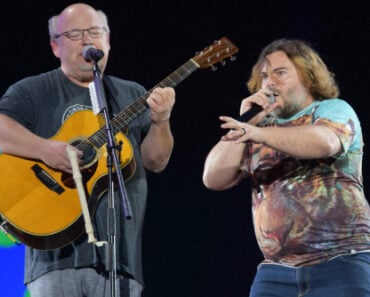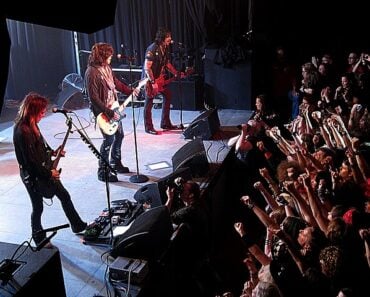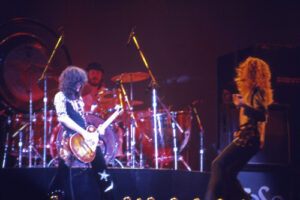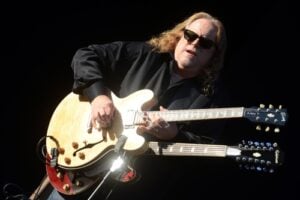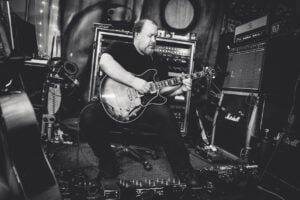
Feature Photo: Shanna Lemke, FAL, via Wikimedia Commons
From the dissolution of one of rock’s most celebrated supergroups, a new sound was born, one that would blend the electric energy of rock with the narrative soul of country music. When the turbulent journey of Buffalo Springfield reached its end in 1968, members Richie Furay and Jim Messina sought to continue the country-rock explorations they had begun on that band’s final album. They united with multi-instrumentalist Rusty Young, drummer George Grantham, and bassist Randy Meisner to form a new collective in Los Angeles. Initially named Pogo, after the comic strip character, the group quickly changed its name to Poco following a legal threat from the strip’s creator, Walt Kelly. This quintet became one of the primary architects of the Southern California country-rock genre, pioneering a synthesis of intricate vocal harmonies, country instrumentation like pedal steel guitar, and a driving rock-and-roll rhythm section.
Over a career spanning more than 50 years, Poco would release 19 studio albums and see more than 20 musicians pass through its ranks, creating a complex and ever-shifting history. The band’s story is one of a profound paradox: it was a crucible of immense creative talent that consistently earned critical acclaim but struggled for mainstream commercial success in its early years. Their 1969 debut, Pickin’ Up the Pieces, is considered a landmark album of the genre and was awarded a five-star rating in the first Rolling Stone Record Guide, yet it peaked at a modest number 63 on the Billboard charts. This pattern of critical respect without corresponding sales figures would define much of their first decade, leading to frustrations that saw many of its most gifted members depart for greater fame, turning Poco into an essential, if somewhat star-crossed, incubator for 1970s rock royalty.
The band’s persistence eventually paid off. A strategic shift in the late 1970s towards a more polished, pop-rock sound brought them their greatest commercial triumphs. The 1978 album Legend became their first to be certified Gold, propelled by two major hit singles: Rusty Young’s ballad “Crazy Love,” which reached number 17 on the Billboard Hot 100 and number 1 on the Adult Contemporary chart, and Paul Cotton’s “Heart of the Night,” which climbed to number 20. A reunion of the original lineup in 1989 produced another Gold album, Legacy, and the Top 20 hit “Call It Love”. The band officially retired from touring in 2013, and its long journey came to a close in April 2021 following the death of Rusty Young, the sole musician who had remained through every iteration of the band’s lineup.
Richie Furay
Richie Furay was a founding member, principal songwriter, and lead vocalist for Poco during the band’s formative years, serving from 1968 until his departure in 1973. He later returned for the successful Legacy reunion from 1988 to 1990 and made occasional guest appearances with the group in subsequent years. As a veteran of Buffalo Springfield, Furay was a central figure in Poco’s creation, bringing a distinct vocal style and songwriting sensibility that blended tender ballads with the exuberant, up-tempo country-rock that would become the band’s signature. His leadership and creative vision were instrumental in establishing Poco as pioneers of the genre.
Furay’s voice and songwriting are featured on the band’s first six studio albums: Pickin’ Up the Pieces (1969), Poco (1970), From the Inside (1971), A Good Feelin’ to Know (1972), and Crazy Eyes (1973), as well as the influential 1971 live album Deliverin’. He penned many of the group’s most iconic early songs, including the title tracks “Pickin’ Up the Pieces” and “A Good Feelin’ to Know,” along with fan favorites like “Kind Woman” and the energetic “C’mon”. He returned to the band for the 1989 reunion album Legacy, contributing vocals and co-writing two songs, “When It All Began” and “If It Wasn’t for You”. Furay left Poco in 1973, reportedly frustrated by the band’s inability to translate its critical acclaim and strong live following into major chart success, a sentiment crystallized by the failure of the anthemic “A Good Feelin’ to Know” to become a hit single.
Outside of Poco, Furay has had a distinguished career. He is a member of the Rock and Roll Hall of Fame for his work with Buffalo Springfield. Immediately after leaving Poco, he formed the Souther-Hillman-Furay Band with songwriter J.D. Souther and ex-Byrd Chris Hillman, which achieved a gold record and a Top 40 hit with Furay’s composition “Fallin’ In Love”. In the late 1970s, he embarked on a solo career and, after becoming a devout Christian, became a pastor in Colorado. He has released numerous solo albums that span both Christian and mainstream country-rock music, including I’ve Got a Reason, Seasons of Change, and The Heartbeat of Love.
Jim Messina
Jim Messina was a co-founder of Poco, serving as the band’s lead guitarist, vocalist, and original producer from 1968 until he left in 1970. He returned to the group for the Legacy reunion, which lasted from 1988 to 1991. Coming from the final lineup of Buffalo Springfield, where he had worked as both a musician and an engineer, Messina’s production expertise was crucial in crafting the polished, tightly arranged sound of Poco’s early work. His sharp, articulate guitar playing was a cornerstone of their sound, and following Randy Meisner’s abrupt departure, he also temporarily took over bass duties during the recording of their debut.
Messina’s production and musicianship are featured on Poco’s first two studio albums, Pickin’ Up the Pieces (1969) and Poco (1970), as well as the 1971 live album Deliverin’. His most notable songwriting contribution from this era was “You Better Think Twice,” a track from the self-titled second album that became a signature song for the band. As producer, his insistence on controlling the final album mixes led to a conflict with Randy Meisner, which precipitated Meisner’s departure from the band. Citing exhaustion from constant touring and a desire to focus on record production, Messina left Poco in October 1970. He rejoined the original lineup for the 1989 album Legacy, contributing several songs including “Look Within” and “Follow Your Dreams”.
Messina’s career after Poco achieved massive commercial success. Intending to produce an album for a young songwriter named Kenny Loggins, the project evolved into the iconic 1970s soft-rock duo Loggins & Messina. Together, they sold more than 16 million albums and scored major hits with songs like “Your Mama Don’t Dance,” “Danny’s Song,” and “House at Pooh Corner,” becoming one of the most successful duos of the decade. Before Poco, Messina had also been a key contributor to Buffalo Springfield’s final album, Last Time Around, as both a musician and engineer.
Rusty Young
Norman “Rusty” Young was a founding member and the sole constant of Poco, performing with the band from its inception in 1968 until his death in April 2021, which effectively ended the band’s 53-year run. A virtuoso multi-instrumentalist, Young was the band’s sonic anchor, most famous for his innovative use of the pedal steel guitar. He was a pioneer in integrating the instrument into a rock context, often using effects to make it sound like an organ or other instruments, which became a defining feature of Poco’s sound. In addition to pedal steel, he played banjo, dobro, mandolin, and various guitars, and over the decades, he grew into a primary songwriter and lead vocalist for the group.
As the only member to appear on every one of Poco’s 19 studio albums and countless tours, Young’s album credits span the band’s entire discography, from Pickin’ Up the Pieces (1969) to their final studio effort, All Fired Up (2013). While his instrumental work was prominent from the start, with tracks like “Grand Junction” on the debut album, his songwriting came to the forefront in the mid-1970s with the epic title track “Rose of Cimarron”. His greatest commercial success as a writer and singer came with the 1978 album Legend, for which he penned and sang the band’s biggest hit, “Crazy Love.” The song topped the Adult Contemporary chart for seven weeks and became a Top 20 pop hit. He was also the driving force behind the 1989 reunion of the original lineup for the Legacy album.
Before Poco, Young was a member of the Denver-based psychedelic rock band Böenzee Cryque, alongside future Poco drummer George Grantham. His career-defining moment came when Richie Furay invited him to Los Angeles to play pedal steel on the Buffalo Springfield song “Kind Woman,” the session that directly led to the formation of Poco. After nearly five decades with the band, Young released his first and only solo album, Waitin’ for the Sun, in 2017, which featured contributions from many of his past and present Poco bandmates.
Randy Meisner
Randy Meisner was the original bassist and a founding member of Poco, serving a brief but impactful tenure from 1968 to 1969. He later returned for the Legacy reunion from 1988 to 1991. Meisner’s clean, soaring high harmony vocals were an essential component of the band’s signature sound on their debut, blending with Richie Furay’s lead to create the vocal style that would define early country-rock. He passed away in July 2023.
Meisner’s contributions are heard on Poco’s debut album, Pickin’ Up the Pieces (1969), for which he recorded all his bass and vocal parts. However, he famously quit the band just before the album’s release. The departure stemmed from a conflict with Richie Furay and producer Jim Messina, who barred Meisner and other band members from the final playback sessions of the album mix, a decision that angered the bassist and prompted his exit. He would not record with Poco again until the original five members reunited for the 1989 album Legacy, where he sang lead on “The Nature of Love” and “Nothin’ to Hide”.
After leaving Poco, Meisner’s career reached monumental heights. He briefly joined Ricky Nelson’s Stone Canyon Band before becoming a founding member of the Eagles in 1971, alongside Glenn Frey, Don Henley, and Bernie Leadon. As a member of the Eagles, he was inducted into the Rock and Roll Hall of Fame. His time with the Eagles produced some of the best-selling albums in music history, and he co-wrote and sang lead on one of their most enduring hits, the 1975 ballad “Take It to the Limit”. After leaving the Eagles in 1977, he embarked on a solo career, releasing albums such as his self-titled debut and One More Song.
George Grantham
George Grantham was the original drummer and a crucial harmony vocalist for Poco, serving multiple tenures with the band. He was a founding member from 1968 to 1977, then returned for stints from 1985 to 1986, 1988 to 1991 for the Legacy reunion, and again from 2000 until 2004, when a debilitating stroke suffered on stage forced his retirement from full-time performing. Grantham’s powerful and steady drumming provided the rock foundation for the band’s country-inflected sound, and his vocal contributions were a key part of their rich, multi-part harmonies.
Grantham played on all of Poco’s albums during their classic era, from the debut Pickin’ Up the Pieces (1969) through Indian Summer (1977). His work is featured on a total of ten studio albums and two official live albums from this period. He later returned to record on the reunion album Legacy (1989) and the 2002 release Running Horse. He also made a guest appearance on the track “All Fired Up” from the band’s final studio album in 2013. He initially left the band in 1977, following the departure of Timothy B. Schmit to the Eagles, which marked the end of a long and stable lineup.
Before co-founding Poco, Grantham was a member of the Denver-based band Böenzee Cryque with Rusty Young, and it was Young who recruited him for Poco. Outside of his primary band, Grantham made a significant contribution to rock history by playing drums on most of Neil Young’s self-titled debut solo album in 1969, a session that also included Jim Messina. After his first departure from Poco, he also did session work for country artists like Ricky Skaggs and Steve Wariner.
Timothy B. Schmit
Timothy B. Schmit joined Poco in September 1969, becoming the band’s bassist and a key vocalist following the departure of Randy Meisner. He remained with the group until 1977, a period during which his melodic bass lines, distinctive high harmony vocals, and emerging songwriting talent became integral to the band’s sound. His arrival stabilized the lineup and helped define the classic Poco era of the 1970s. He later returned for a guest appearance on the 1984 album Inamorata.
Schmit’s tenure with Poco began with their second album, Poco (1970), and continued through Indian Summer (1977), encompassing a total of eight studio albums and the live album Deliverin’. He made his first songwriting contribution with “Keep on Believin’,” co-written with Richie Furay for the Poco album. His most significant hit with the band was “Keep On Tryin’,” a song he wrote and sang lead on for the 1975 album Head Over Heels. It became the group’s highest-charting single up to that point. Other notable songs he penned for the band include “I Can See Everything” and “Here We Go Again”.
In a remarkable twist of fate, Schmit left Poco in September 1977 to join the Eagles, where he once again replaced Randy Meisner. This move propelled him to international stardom, and he was inducted into the Rock and Roll Hall of Fame as a member of the Eagles. With the Eagles, he co-wrote and sang lead on their major hit “I Can’t Tell You Why”. Schmit has also maintained a successful solo career, releasing several albums such as Playin’ It Cool, Timothy B., Expando, and Leap of Faith. He is a highly sought-after session musician, having contributed vocals and bass to recordings by Steely Dan, Toto, Bob Seger, and Crosby, Stills & Nash, and has frequently toured as a member of Ringo Starr’s All-Starr Band.
Paul Cotton
Paul Cotton joined Poco in October 1970 as the replacement for Jim Messina, taking over duties on lead guitar and vocals. His arrival marked a significant shift in the band’s sound, infusing their country-rock foundation with a harder, more rock-oriented edge. Cotton became one of the band’s most prolific songwriters and a dominant creative force for nearly four decades, with tenures from 1970 to 1987 and again from 1991 to 2010. He passed away in July 2021.
Cotton’s contributions are featured on every Poco studio album from From the Inside (1971) through The Wildwood Sessions (2006), the only exception being the 1989 Legacy reunion album. He wrote and sang lead on some of the band’s most beloved and commercially successful songs. His signature composition, “Heart of the Night,” was a Top 20 hit from the 1978 album Legend and remains an iconic track of the era, evoking the atmosphere of New Orleans. He also penned a long list of other Poco classics, including “Indian Summer,” “Barbados,” “Bad Weather,” “Ride The Country,” and “Keeper Of The Fire”.
Before his long career with Poco, Cotton was a co-founder of the Chicago-based band Illinois Speed Press, which recorded two albums for Columbia Records and gained notoriety for their powerful dual-lead-guitar sound. During breaks from Poco and after his final departure, Cotton pursued a solo career, releasing several albums including Changing Horses (1990), Firebird (2000), and When the Coast Is Clear (2004).
Steve Chapman
Steve Chapman served two tenures as the drummer for Poco, first from 1978 to 1985 and again from 1986 to 1987. He joined the band along with bassist Charlie Harrison, forming a new, all-British rhythm section that helped define the sound of the band’s most commercially successful period. His powerful and precise drumming was a key component of the band’s shift towards a more polished, album-oriented rock (AOR) sound that began with the Legend album.
Chapman’s drumming is featured on five consecutive Poco studio albums, a period of significant chart activity for the band. His work can be heard on Legend (1978), Under the Gun (1980), Blue and Gray (1981), Cowboys & Englishmen (1982), and Ghost Town (1982). He was also a member of the lineup that recorded the 1984 album Inamorata. Before joining Poco, the British-born musician was a member of the band Junior’s Eyes.
Charlie Harrison
Charlie Harrison was the bassist and a backing vocalist for Poco from 1978 to 1984. He joined alongside drummer Steve Chapman, and together they provided the solid, driving rhythm section for the Legend era, which saw the band achieve its greatest commercial success. Harrison’s tenure marked a departure from the band’s earlier, more fluid bass styles, bringing a straightforward rock foundation that complemented their move toward a more mainstream sound.
Harrison’s bass playing can be heard on four of Poco’s studio albums: the Gold-certified Legend (1978), Under the Gun (1980), the Civil War-themed Blue and Gray (1981), and Cowboys & Englishmen (1982). He was also the bassist on the album Ghost Town, released later in 1982. Before moving to the United States and joining Poco, Harrison was a professional musician in his native UK, where he played in the Birmingham-based band Paradox and later in Judas Jump. During his early career, he also played alongside notable artists such as Al Stewart and Leo Sayer.
Kim Bullard
Kim Bullard was Poco’s first dedicated keyboardist, joining the band in December 1978 and remaining a member until 1983. His arrival coincided with the release of the Legend album and expanded the band’s lineup to a five-piece, adding a new sonic dimension to their music. Bullard’s use of keyboards and synthesizers was instrumental in shaping the polished, contemporary AOR sound that characterized Poco’s albums in the early 1980s.
Although he joined just as Legend was hitting the charts, Bullard’s first full studio recording with the band was Under the Gun (1980). He went on to play on Blue and Gray (1981), Cowboys & Englishmen (1982), Ghost Town (1982), and made his final appearance on Inamorata (1984). His keyboard work and backing vocals were a prominent feature of this era.
Bullard has enjoyed a highly successful and prolific career outside of Poco as a keyboardist, producer, and composer. He has toured and recorded with an extensive list of major artists, including Crosby, Stills & Nash, Yes, Heart, and Cher. In 1987, he co-produced and co-wrote four songs on Tori Amos’s first album, Y Kant Tori Read. Since 2009, he has been a member of the Elton John Band, performing worldwide as their keyboardist. He also produced the debut album for his daughter, singer Katy Rose, in 2004.
Jeff Steele
Jeff Steele served a brief tenure as the bassist and backing vocalist for Poco from 1984 to 1985. He joined the band during a transitional period, replacing Charlie Harrison. His time with the group fell between the release of the Inamorata album and the subsequent reformation of the classic lineup for the Legacy project. As a result, Steele toured with the band but does not appear on any of Poco’s official studio albums. His career outside of his time in Poco is not detailed in available records.
Rick Seratte
Rick Seratte was the keyboardist and backing vocalist for Poco from 1984 to 1985, joining at the same time as bassist Jeff Steele. He was part of a touring lineup that bridged the gap between the Inamorata era and the band’s later reunions. Like Steele, Seratte’s time with the band did not coincide with the recording of a studio album, so his contributions were primarily in their live performances.
Beyond his work with Poco, Seratte has built a distinguished career as a keyboardist and vocalist for a wide array of high-profile rock acts. He has recorded and toured with several Grammy-winning and multi-platinum artists, including Whitesnake, Foreigner, Rick Springfield, and the Spencer Davis Group. His versatile talents have made him a sought-after musician for both studio sessions and international tours.
Jack Sundrud
Jack Sundrud had a long and recurring history with Poco, serving three separate tenures that made him one of the band’s most enduring members. He first joined as bassist and vocalist from 1985 to 1987, returned for a brief period from 1990 to 1991, and then rejoined permanently from 2000 until the band’s dissolution in 2021, making him a cornerstone of the final lineups. His solid bass playing, strong vocals, and songwriting skills were vital to the band’s sound in its later decades.
Sundrud’s studio work with Poco includes the albums Running Horse (2002) and the band’s final studio release, All Fired Up (2013). He was a key creative contributor to these later albums, writing or co-writing several tracks, including “Never Loved…Never Hurt Like This,” “Shake It,” and “Drink It In”. He also co-produced the All Fired Up album with fellow band member Michael Webb.
A respected figure in the Nashville music scene, Sundrud toured with Vince Gill and Allman Brothers Band guitarist Dickey Betts before his first stint with Poco. In the 1990s, he was the frontman for the country-rock band Great Plains, which scored a Top 25 country hit with “Faster Gun”. As a songwriter, he has had significant success, co-writing Ty Herndon’s number-one country hit “It Must Be Love” and the Top 30 hit “Cain’s Blood” for the group 4 Runner. He is currently a member of the band Cimarron 615, which features other Poco alumni.
Gary Mallaber
Gary Mallaber, a highly accomplished session drummer, had a brief tenure with Poco in 1991. He was brought in to play drums for a tour of Japan that took place after the initial Legacy reunion tour had concluded, joining a lineup that at the time featured Jim Messina, Rusty Young, and Randy Meisner. His time with the band was limited to this series of live performances, and he does not appear on any of Poco’s studio albums.
Mallaber’s career outside of Poco is extensive and distinguished, with his work appearing on over 80 gold and platinum records. He is best known for his long and fruitful collaboration with the Steve Miller Band, playing drums on and co-writing songs for their classic albums, including Fly Like an Eagle, Book of Dreams, and Abracadabra. He also had a formative collaboration with Van Morrison, contributing to the seminal Moondance album. His session credits are vast, including work with Bruce Springsteen, Eddie Money, Peter Frampton, Bob Seger, The Beach Boys, and Warren Zevon. He also appeared as a musician in the 1974 Brian De Palma cult film Phantom of the Paradise.
David Vanacore
David Vanacore served as the keyboardist for Poco during the Legacy reunion tour from 1990 to 1991. He was part of the touring band that supported the successful reunion of the original five members, providing keyboard textures that updated their classic sound for a contemporary audience. His time with the band was focused on these live performances, and he did not contribute to any of Poco’s studio albums.
After his time on the road with Poco, Vanacore built an exceptionally successful career in a different area of the music industry, becoming one of the most prolific and award-winning television music composers of his generation. Dubbed “The King of Reality” by industry insiders, he is the creative force behind the musical scores for hundreds of television series. His most notable work includes composing the iconic themes and underscore for massive global hits such as Survivor, The Apprentice, Big Brother, Hell’s Kitchen, and Wipeout. He founded Vanacore Music, a major production music house, and has won numerous ASCAP awards for his work.
Richard Neville
Richard Neville was the bassist and a vocalist for Poco for nearly a decade, from 1991 to 2000. He was a member of the stable and hard-working touring lineup of the 1990s, alongside Rusty Young, Paul Cotton, and drummer Tim Smith. This version of the band maintained a consistent presence on the road, performing Poco’s extensive catalog for dedicated fans across the country. He passed away in July 2023.
During Neville’s nine-year tenure, the band focused primarily on touring and did not release a new studio album; their next one, Running Horse, would not come out until 2002, after his departure. Therefore, his contributions are preserved in the band’s live legacy from that decade rather than on studio recordings. An Oklahoma native, Neville began his musical career playing in local bands before serving in the U.S. Army. After his service, he embarked on a long career as a professional musician, touring with artists such as Vince Gill and Ronnie Dunn. In his later years, he worked in music retail in Flagstaff, Arizona, sharing his passion and expertise with a new generation of musicians.
Tim Smith
Tim Smith was the drummer for Poco from 1991 to 2000, holding the position for nine years as part of the consistent touring lineup that also included Rusty Young, Paul Cotton, and Richard Neville. Known for his versatile and song-oriented drumming style, Smith provided the rhythmic foundation for the band’s live shows throughout the 1990s.
Like the other members of the 1990s lineup, Smith’s contributions to Poco were primarily on the stage. While he appeared on a live album recorded in Japan, he did not play on any of the band’s official studio albums, as his tenure fell between the Legacy and Running Horse projects. Outside of Poco, Smith has had a notable and diverse career. He is particularly recognized for his groundbreaking drumming on the multi-platinum, Grammy-nominated debut album from the Christian crossover group Jars of Clay, which featured their hit song “Flood”. He has also toured and recorded with a wide range of artists, including country icon Brenda Lee, singer-songwriter Matraca Berg, and the duo Joey + Rory.
George Lawrence
George Lawrence was Poco’s drummer from 2004 to 2016, taking over the role after original drummer George Grantham suffered a stroke. Lawrence, a respected Nashville session musician known for his “deep pocket groove,” had previously subbed for the band in 1999 and was a natural fit to carry on their rhythmic legacy. He provided a steady and professional presence for over a decade of touring.
Lawrence’s drumming is featured on Poco’s final studio album, All Fired Up, which was released in 2013. He also played on the 2005 live album Bareback at Big Sky. Beyond his work with Poco, Lawrence is a prominent figure in the Nashville drumming community. He has recorded with numerous artists in Nashville, Los Angeles, and Muscle Shoals and has taught thousands of students, including the renowned drummer Keith Carlock (of Steely Dan and Sting fame). He is also the owner and publisher of Not So Modern Drummer magazine and produces the annual Nashville Drum Show.
Michael Webb
Michael Webb was a versatile multi-instrumentalist for Poco from 2010 to 2018. In the tradition of Poco’s musical utility players, Webb contributed on keyboards, guitar, mandolin, accordion, bass, and vocals, adding significant depth and texture to the band’s later live shows and recordings.
Webb was a key member of the lineup that recorded Poco’s final studio album, All Fired Up (2013). He co-produced the album with Jack Sundrud and contributed two of his own compositions, “That’s What Rock and Roll Will Do” and “Love Has No Reason”. Outside of Poco, Webb has an extensive resume as a session musician and touring player. He has recorded with acclaimed artists such as Chris Stapleton and John Prine and has toured with music legends like John Fogerty and Hank Williams, Jr.. He is also currently a member of the band Cimarron 615, alongside fellow Poco alumni Jack Sundrud and Rick Lonow.
Lex Browning
Lex Browning served as Poco’s lead guitarist, fiddler, mandolin player, and vocalist from 2018 to early 2020. He joined the band for its final years of touring, bringing his multi-instrumental skills to their live performances. His tenure with the band did not include any studio recordings.
Browning’s connection to the Poco family tree predates his official membership. In the 1990s, he was a member of the country-rock band Great Plains, which was fronted by his future Poco bandmate, Jack Sundrud. A native of Kentucky, Browning has had a diverse career, playing fiddle for zydeco star Queen Ida and working as a staff writer in Nashville. He has also recorded and performed with artists such as Kenny Rogers and Quarterflash and was a founding member of the Portland-based Trail Band. He has also released his own solo material, including the album Good Rain.
Rick Lonow
Rick Lonow was the drummer for the final lineup of Poco, serving from 2016 until the band’s end in 2021. As the band’s last drummer, he provided percussion and backing vocals for their final years of touring. While he did not appear on a studio album as a performing member, his connection to the band’s history is significant.
Lonow was a co-writer of “Call It Love,” one of Poco’s biggest hits, which appeared on the 1989 Legacy album and reached number 18 on the Billboard Hot 100. This contribution cemented his place in the band’s story long before he officially joined. His career as a drummer and songwriter includes session work with legendary artists such as Johnny Cash and Loretta Lynn. He is currently a member of the band Cimarron 615, where he continues to play with former Poco members Jack Sundrud and Michael Webb.
Tom Hampton
Tom Hampton was the final musician to join Poco, serving as the band’s lead guitarist and vocalist from 2020 until its dissolution in 2021. He was recruited to fill in for a series of shows in early 2020 and was soon after offered a permanent position, stepping into the role for the band’s last year of activity. His tenure did not include any studio recordings with the group.
Hampton’s entry into Poco was the culmination of years of working within the band’s extended musical family. A versatile multi-instrumentalist, he had a long-standing connection with Poco bassist Jack Sundrud through their band Idlewheel. He also had a history of performing with other artists from the country-rock world, including Craig Fuller of Pure Prairie League and even former Poco guitarist Paul Cotton on occasion. This deep network of connections made him a fitting choice to become the last in a long line of talented guitarists to play for the legendary band.
Check out more Poco articles on ClassicRockHistory.com Just click on any of the links below……
Complete List Of Poco Studio Albums And Songs
Top 10 Poco Songs
Read More: Artists’ Interviews Directory At ClassicRockHistory.com
Read More: Classic Rock Bands List And Directory


